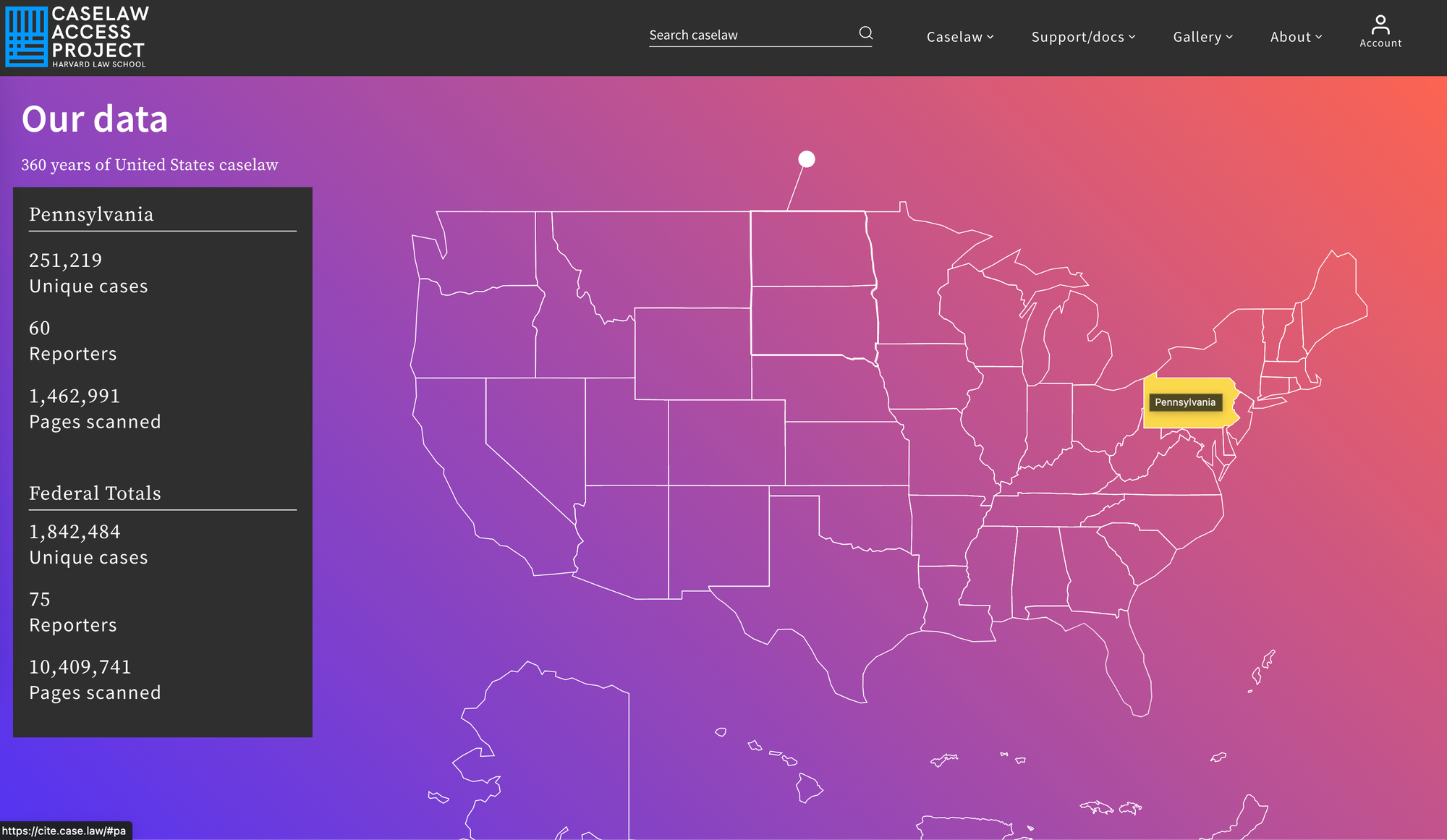What is the Caselaw Access Project?
The Caselaw Access Project (CAP) is a legal database and search engine. Between 2013 and 2018, Harvard Law School Library digitized over 40 million pages of U.S. court data from 1685 to 2018. In this guide, we will provide an overview of CAP's value, highlight existing restrictions on its use, and provide examples for using CAP API when restrictions are lifted in 2024.
Caselaw Access Project Dataset Statistics
Federal Caselaw Totals
- 1,842,484 Unique cases
- 75 Reporters
- 10,409,741 Pages scanned
State Caselaw Totals
- 6,930,777 Unique cases
- 612 Reporters
- 36,357,668 Pages scanned
Pennsylvania Caselaw Totals
- 251,219 Unique cases
- 60 Reporters
- 1,462,991 Pages scanned

Why The Caselaw Access Project Exists
To Inspire Digital Transformation
One purpose behind the Caselaw Access Project was to inspire digital transformation in the nation's court systems by providing a framework for online, machine-readable legal data.
To Dissuade Textbook Publication Prior To Online Publication
Another purpose was to dissuade states from working with textbook publishers before releasing cases online.
“A project like this should be unnecessary,”...“But many states are still putting stuff in books first.”
- Andrew Ziegler, director of the Library Innovation Lab
CAP and Ravel Law (now LexisNexis)
So how did we get here?
The digitization of Harvard’s extensive legal library was made possible through a collaboration with Ravel Law, since acquired by LexisNexis.
The Deal with Ravel Law
Ravel agreed to conduct and pay for Harvard’s digitization efforts. Ravel paid the total cost of digitization in exchange for a temporary exclusive license to use data from restricted jurisdictions. Harvard also obtained a 4% equity interest in Ravel.
Usage and Access Restrictions
"Bulk access to this data is limited by virtue of Harvard’s agreement with Ravel (and now LexisNexis). Under that agreement, LexisNexis retains control over the commercial use of this data through March 2024. Any company wishing to use it for commercial purposes would have to license it from LexisNexis. The agreement requires LexisNexis to offer the data commercially on reasonable terms"
- Andrew Ziegler, director of Harvard Library Innovation Lab
Current User Types and Permissions
Unregistered Users
Access all metadata, Unlimited API access to all cases from open jurisdictions, and Bulk Download all cases from open jurisdictions
Registered Users
Access all metadata, Unlimited API access to all cases from open jurisdictions, Access to 500 cases per day from restricted jurisdictions, and Bulk Download all cases from open jurisdictions.
Researchers
Access all metadata, Unlimited API access to all cases, and Bulk Downloads from all jurisdictions.
Changes in Caselaw Access Project License Structure
Open Jurisdictions v. Restricted Jurisdictions
It's important to note that the CAP database comprises "open" and "restricted" jurisdictions. An "open" jurisdiction is one where newly issued cases are freely available online in a citable, machine-readable format. Open jurisdictions include Illinois, Arkansas, New Mexico, and North Carolina. A "restricted" jurisdiction is one where newly issued cases are not freely available online in machine-readable format.
Part of a larger trend towards accessible legal data
The removal of commercial restrictions on CAP data is part of a broader trend. Attorneys, technologists, and the public want access to the justice system through free bulk data and open source software.
For example, Free Law Project is building an open electronic filing system.
For over a decade we have lamented the growing trend of eFiling and Case Management systems that make money by selling court records. These proprietary systems put an anti-democratic price on legal research and understanding.

We're excited about these changes
At Counsel Stack, we embrace the broader trend towards democratization of legal data in the hopes it will inspire competition, foster access to justice, and improve the quality of legal services. Everyone stands to benefit from a more open legal system.
To celebrate the removal of Caselaw Access Project restrictions, we created a detailed overview of the CAP API with code examples written in Python.




